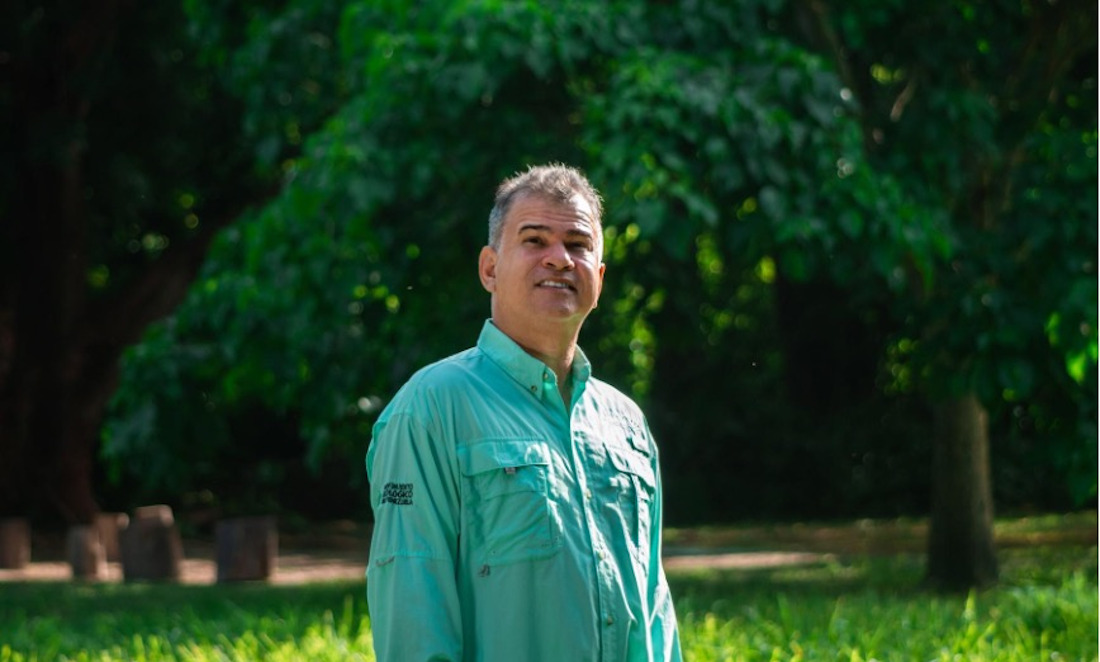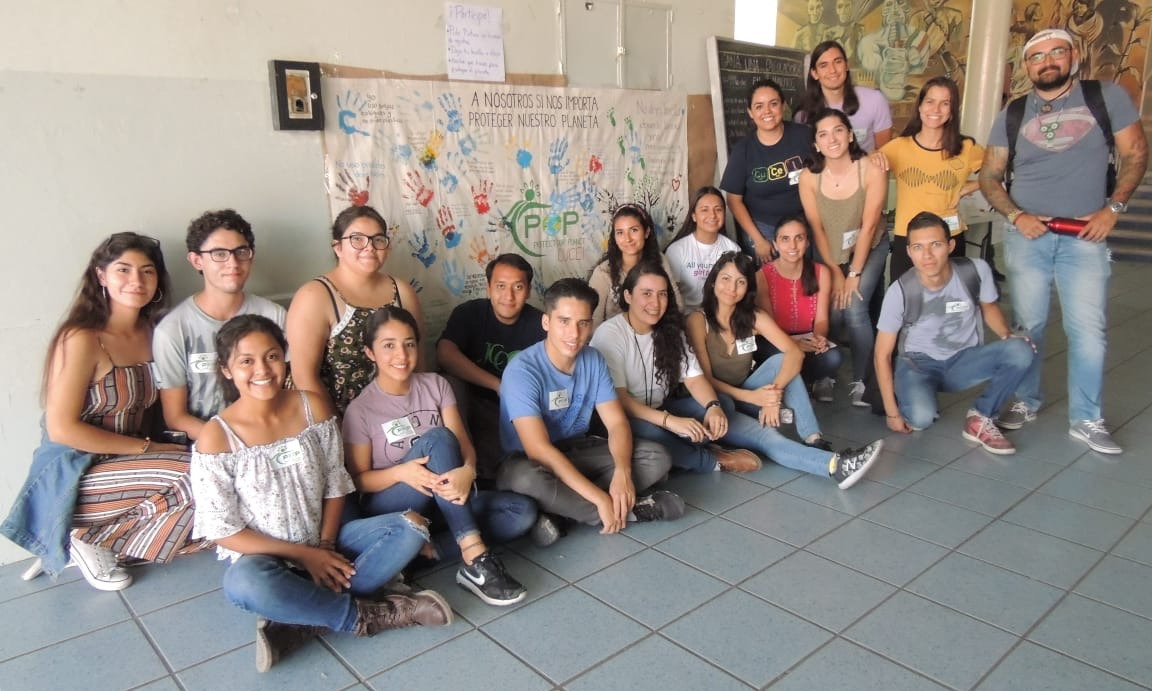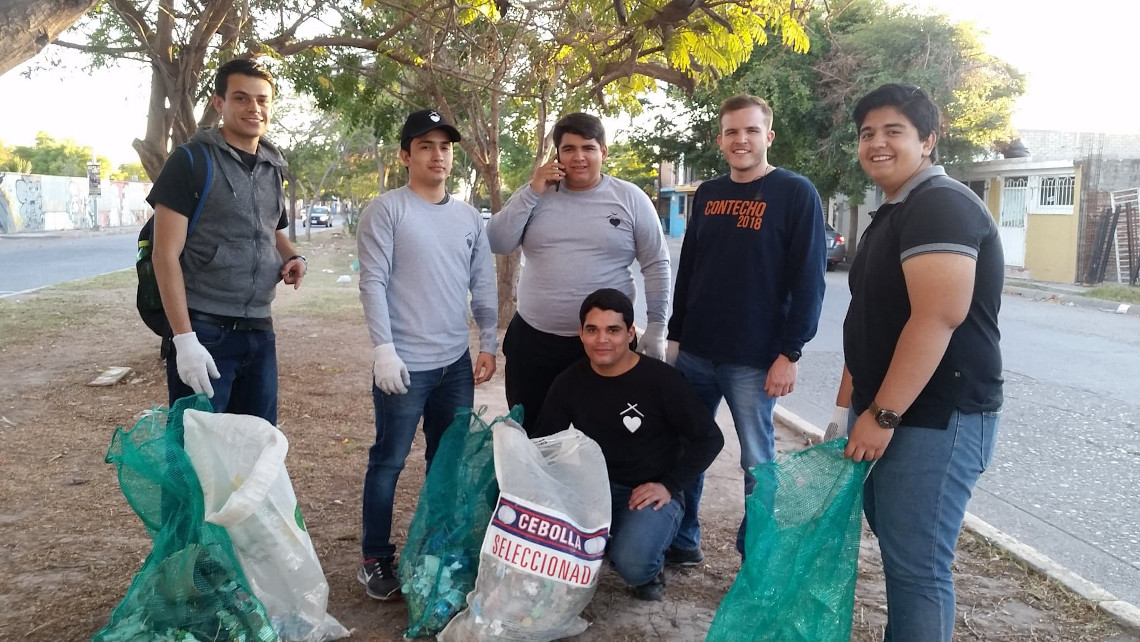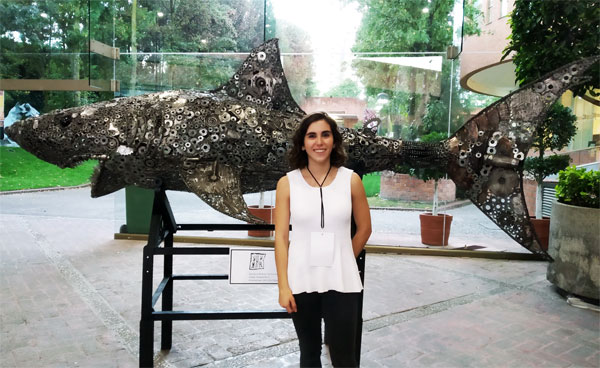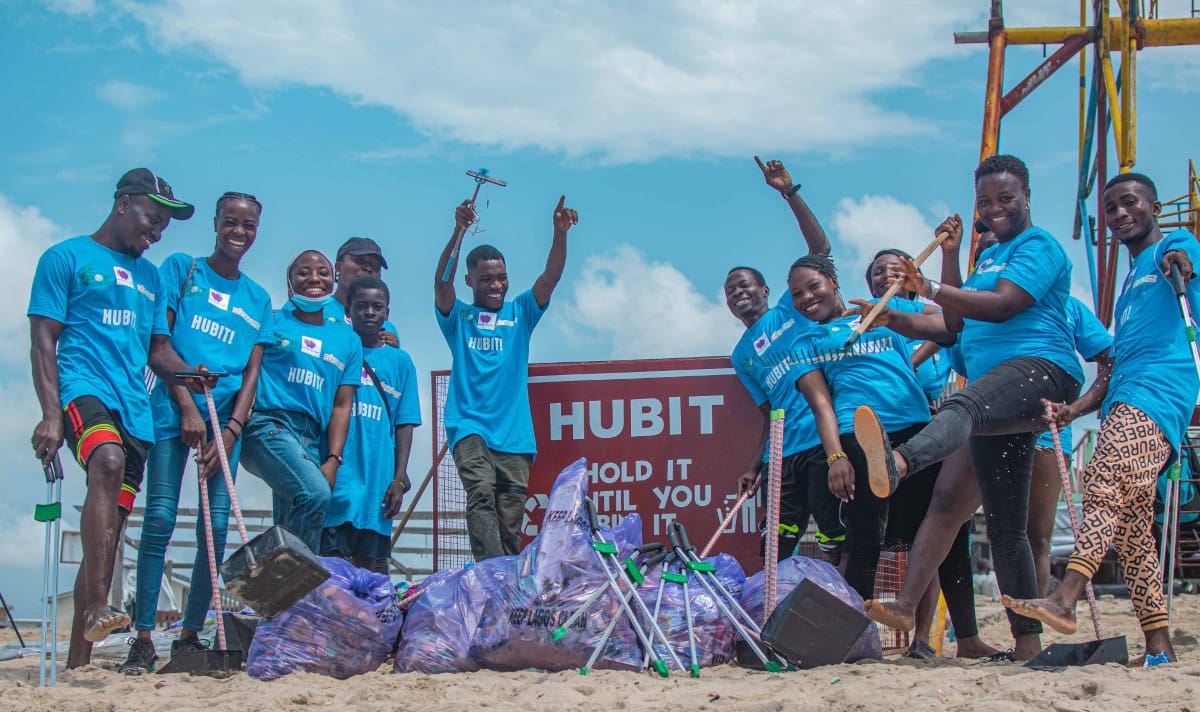
I strive to replicate the success of the POP Nigeria Initiative
By Samuel C. Okorie, POP Youth Mentor and Ambassador for Africa | August 2023With a strong commitment to combating climate change and a deep understanding of its social implications, Samuel serves as a POP Movement Youth Mentor and Ambassador for Africa, as well as a European Climate Pact Ambassador for the European Union. His expertise as a sociologist, researcher, and community development professional encompasses Climate Change, Loss and Damage (L&D), Disaster Risk Reduction (DRR), Advocacy in Climate Change Policy Negotiations, Project Planning and Management, and Mobilization.
For more than five years, Samuel has been at the forefront of mobilizing youth and communities for climate action, leading campaigns, implementing policies, and advocating for sustainable practices. He has worked extensively with diverse groups and communities across the globe, with a particular focus on rural communities, schools, stakeholders, and policy-makers. Samuel’s innovative approaches have contributed to the development of robust frameworks that strengthen climate change adaptation and address the pressing crises we face today.
In this exclusive interview, Samuel shares valuable insights into the POP Nigeria Initiative and his pivotal role as a POP Youth Mentor and Ambassador for Africa. He candidly discusses the driving forces behind his involvement, the crucial steps taken to initiate and pioneer the POP Nigeria Initiative, the remarkable successes achieved thus far, and the distinctive qualities that set the initiative apart. Additionally, Samuel delves into his experiences as a mentor and ambassador, shedding light on the transformative impact of the initiative and reflecting on his extraordinary journey.
What inspired the inception of the POP Nigeria Initiative? Were there any specific barriers that stood in your way?
I started my journey with the POP Movement in 2018-2019, initially as a POP Youth CAN (Climate Action Now) Star and later as a Youth Mentor and Ambassador for Africa in 2021. During this time, I recognized the pressing need to address climate education in Nigeria, as it was an area that had relatively received little attention. Few organization had ventured into this domain, and their progress was hindered by challenges in engaging the government and garnering support for climate education initiatives in schools.
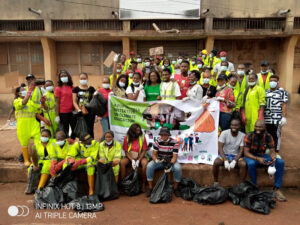 Introducing the POP Nigeria Initiative on Climate Education was not without its difficulties, especially considering the responses we encountered from the Nigerian government. They expressed scepticism about the feasibility of implementing the POP Initiative in Nigeria, and their lack of willingness to provide support or lend a listening ear to initiatives promoting climate education in schools. Furthermore, the recruitment of volunteers posed its own challenges, as it required financial resources, time, manpower, and extensive logistical planning
Introducing the POP Nigeria Initiative on Climate Education was not without its difficulties, especially considering the responses we encountered from the Nigerian government. They expressed scepticism about the feasibility of implementing the POP Initiative in Nigeria, and their lack of willingness to provide support or lend a listening ear to initiatives promoting climate education in schools. Furthermore, the recruitment of volunteers posed its own challenges, as it required financial resources, time, manpower, and extensive logistical planning
As the pioneer of the POP Nigeria Initiative, what were some pivotal initial steps you took?
When I came on board, my first priority was to assemble a dedicated group of volunteers who would work with me to make the POP Nigeria Initiative on climate education a resounding success. I formed a working group that supported me in various areas, including graphics, data collection, volunteer coordination based on geographical zones, and securing partnerships. Managing a team of individuals can be difficult, but effective role designation and clear communication played a vital role in overcoming any difficulties that arose.
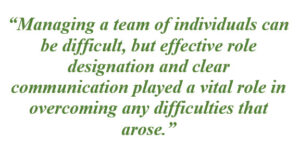 The journey towards the training of trainers (ToT) program and the launch of the POP Nigeria Initiative encountered a few setbacks. We had to reschedule the date twice to ensure the involvement of the Federal Ministry of Environment and secure the commitment of the Nigerian Government to climate change education. While we were told to proceed without them, I recognized the significance of leveraging their extensive network and chose to wait for their participation. The training proved crucial for the volunteers, working group members, and core team involved in the POP Nigeria Initiative.
The journey towards the training of trainers (ToT) program and the launch of the POP Nigeria Initiative encountered a few setbacks. We had to reschedule the date twice to ensure the involvement of the Federal Ministry of Environment and secure the commitment of the Nigerian Government to climate change education. While we were told to proceed without them, I recognized the significance of leveraging their extensive network and chose to wait for their participation. The training proved crucial for the volunteers, working group members, and core team involved in the POP Nigeria Initiative.
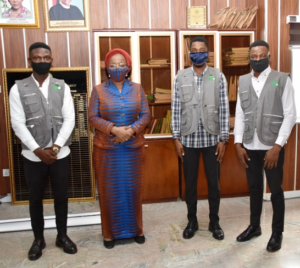 Before embarking on our first on-site project, we conducted an initial online project as an onboarding program to formally launch the POP Nigeria Initiative on Climate Education on March 23, 2021. This event featured the Honorable Minister for Environment as the Keynote Speaker, along with other esteemed members of her Cabinet.
Before embarking on our first on-site project, we conducted an initial online project as an onboarding program to formally launch the POP Nigeria Initiative on Climate Education on March 23, 2021. This event featured the Honorable Minister for Environment as the Keynote Speaker, along with other esteemed members of her Cabinet.
Can you share some notable successes of the POP Nigeria Initiative?
The POP Nigeria Initiative on Climate Education achieved a significant milestone with the endorsement and collaboration of the Nigerian Government, particularly the Federal Ministry of Environment. This endorsement and approval as a climate education project has been a major milestone in making the initiative a huge success in Nigeria, to date. We carried out the first on-site project, initially covering three out of six states in the South-South region, followed by three out of five states in the South East. We encountered life-threatening risks during certain instances. Once I was stranded in an open fireplace in a region that was under severe violent conflict by unknown gunmen and the Nigerian Army.
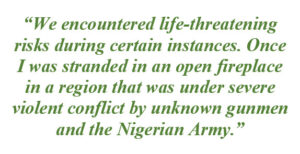 Even after that, the initiative successfully organized the first climate change strike in the South East, which received significant coverage in national newspapers across Nigeria. In the Southeastern region, we had massive participation and mobilization support from the State Commissioner for Environment and aid from some civil society organizations (CSOs). In the South Western region too, the POP Nigeria Initiative made great progress by engaging with four states.
Even after that, the initiative successfully organized the first climate change strike in the South East, which received significant coverage in national newspapers across Nigeria. In the Southeastern region, we had massive participation and mobilization support from the State Commissioner for Environment and aid from some civil society organizations (CSOs). In the South Western region too, the POP Nigeria Initiative made great progress by engaging with four states.
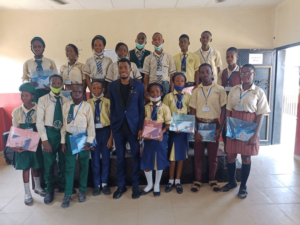 Although the North East, North Central, and North Western regions were also covered, the intensity of terrorist attacks and violent conflicts limited our engagement to three states in the North Central region. Despite these challenges, the POP Nigeria Initiative achieved substantial progress throughout its operations.
Although the North East, North Central, and North Western regions were also covered, the intensity of terrorist attacks and violent conflicts limited our engagement to three states in the North Central region. Despite these challenges, the POP Nigeria Initiative achieved substantial progress throughout its operations.
In what ways does the POP Nigeria Initiative distinguish itself from other environmental projects?
The primary focus of the POP Nigeria Initiative is to provide climate education to secondary school and tertiary institution students, youth, and community members. Through the initiative, we also emphasize meaningful engagement with stakeholders and policy-makers to address climate change crises in the country.
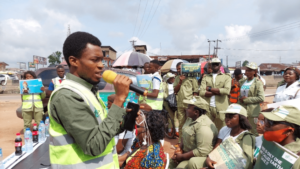 The POP Nigeria Initiative on Climate Education encompasses a range of activities, including tree planting, establishment of agroecology farms, landscaping, climate strikes, advocacy efforts, climate change campaigns, climate change quizzes, water, sanitation, and hygiene (WASH) initiatives, and waste management programs.
The POP Nigeria Initiative on Climate Education encompasses a range of activities, including tree planting, establishment of agroecology farms, landscaping, climate strikes, advocacy efforts, climate change campaigns, climate change quizzes, water, sanitation, and hygiene (WASH) initiatives, and waste management programs.
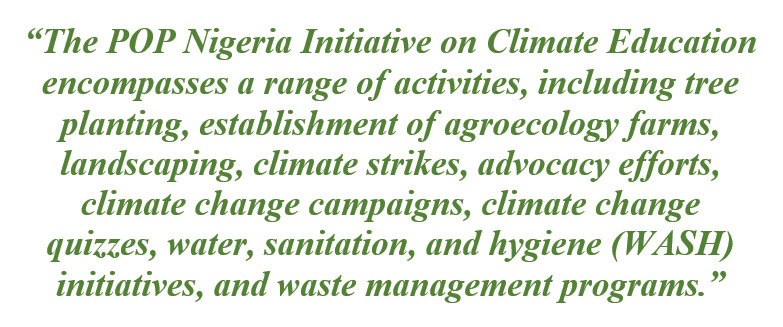 One of the strengths of the initiative is its inclusive nature, respecting diverse perspectives from all individuals. To date, we have been able to cover approximately 27 states across six geopolitical zones of Nigeria, namely South West, South East, South South, North West, North East, and North Central. Through collaborations with other organizations and government agencies, we have successfully reached a target audience of over 2000,000 individuals, thereby implementing the POP Nigeria Initiative on Climate Education.
One of the strengths of the initiative is its inclusive nature, respecting diverse perspectives from all individuals. To date, we have been able to cover approximately 27 states across six geopolitical zones of Nigeria, namely South West, South East, South South, North West, North East, and North Central. Through collaborations with other organizations and government agencies, we have successfully reached a target audience of over 2000,000 individuals, thereby implementing the POP Nigeria Initiative on Climate Education.
As a POP Youth Mentor and Ambassador for Africa, how would you characterize your role and contributions within the POP Movement?
My role as POP Youth Mentor and Ambassador for Africa has been incredibly fulfilling. In addition to overseeing projects in Nigeria, I have the opportunity to contribute to other remarkable initiatives within the POP Africa network. My main focus is mentoring youth across Africa, empowering them to create climate-resilient societies by taking up climate solution-based projects that address the pressing challenges of climate change in their regions.
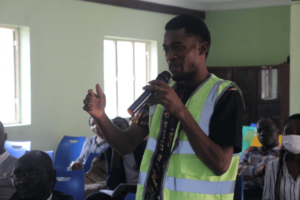 Aside from spearheading the POP Nigeria Initiative on Climate Education, I have collaborated in hosting and organizing projects under the POP Movement. One notable example is the student MP Climate Surgery, where students engage directly with Members of Parliament to advocate for climate action. Furthermore, I assist local organizations in Nigeria in accessing seed grants to implement their projects. I also engage in dialogue with relevant organizations to secure further support for local initiatives in Nigeria.
Aside from spearheading the POP Nigeria Initiative on Climate Education, I have collaborated in hosting and organizing projects under the POP Movement. One notable example is the student MP Climate Surgery, where students engage directly with Members of Parliament to advocate for climate action. Furthermore, I assist local organizations in Nigeria in accessing seed grants to implement their projects. I also engage in dialogue with relevant organizations to secure further support for local initiatives in Nigeria.
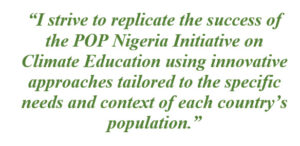 As an Ambassador for POP Africa, I have been able to mentor, guide, and supervise POP African Youth Projects in various countries across the continent. This has helped me a lot to understand the diverse climate change issues faced by Africans in their respective countries. It has also allowed me to identify common challenges shared by different African nations. By leveraging this knowledge, I strive to replicate the success of the POP Nigeria Initiative on Climate Education using innovative approaches tailored to the specific needs and context of each country’s population.
As an Ambassador for POP Africa, I have been able to mentor, guide, and supervise POP African Youth Projects in various countries across the continent. This has helped me a lot to understand the diverse climate change issues faced by Africans in their respective countries. It has also allowed me to identify common challenges shared by different African nations. By leveraging this knowledge, I strive to replicate the success of the POP Nigeria Initiative on Climate Education using innovative approaches tailored to the specific needs and context of each country’s population.
Did the POP Nigeria Initiative set off a snowball effect? If so, could you elaborate on how it unfolded?
The impact of the POP Nigeria Initiative on Climate Education has transcended national boundaries, becoming a powerful legacy that has been replicated in other African countries. The youth I have mentored across these countries have initiated their own climate action projects, addressing climate change issues specific to their regions. It has been inspiring to witness their desire to replicate the climate education project in their respective countries, adopting innovative models tailored to their unique needs and effectively addressing climate change challenges. These initiatives have been a huge success, with profound solutions emerging.
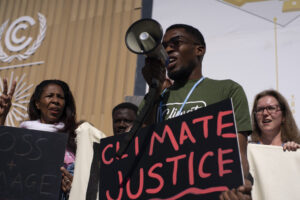 For example, in Cameroon, they have adopted a climate education project with a focus on climate quizzes and tree planting. In Zimbabwe, the emphasis is on climate education related to land degradation and waste management. Ivory Coast has taken the lead in educating secondary school and tertiary institution students about climate change and ways to mitigate and adapt to it. Uganda is implementing climate education and tree planting initiatives within schools and various sectors. Sierra Leone has prioritized climate education and established green gardens in schools to combat climate change. In Liberia, youth are engaged in climate education and climate action to address climate change challenges. These are just a few examples among countless POP Africa’s youth-led projects that I have had the privilege to supervise and mentor as a POP Youth Mentor and Ambassador for Africa.
For example, in Cameroon, they have adopted a climate education project with a focus on climate quizzes and tree planting. In Zimbabwe, the emphasis is on climate education related to land degradation and waste management. Ivory Coast has taken the lead in educating secondary school and tertiary institution students about climate change and ways to mitigate and adapt to it. Uganda is implementing climate education and tree planting initiatives within schools and various sectors. Sierra Leone has prioritized climate education and established green gardens in schools to combat climate change. In Liberia, youth are engaged in climate education and climate action to address climate change challenges. These are just a few examples among countless POP Africa’s youth-led projects that I have had the privilege to supervise and mentor as a POP Youth Mentor and Ambassador for Africa.
The uniqueness of the POP Nigeria Initiative on Climate Education has garnered significant interest, making it readily adaptable and relatable to diverse African contexts. This has sparked the enthusiasm of youth, with a growing number seeking to implement climate education projects inspired by the success of the POP Nigeria Initiative.
Looking back on your remarkable journey thus far, what would you say has been the best part of this experience?
The POP Nigeria Initiative has been a transformative experience for me both professionally and personally. It has provided an exceptional platform within the POP Movement for me to build up my leadership skills and acquire new skills including the ability to speak to people all over the world. I have had the opportunity to interact with great minds from all over the world including presidents of countries, global leaders, and distinguished members of parliaments. These interactions have broadened my perspectives and enriched my knowledge.
As a POP Youth mentor and Ambassador for Africa, I consider it an honour to have reached out to and connected with thousands of youth 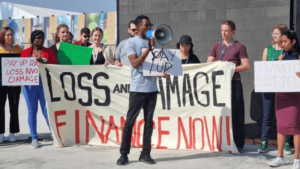 worldwide. Engaging with young people from over 50 countries, and the number still growing, has been a truly fulfilling experience. It is a great opportunity that I do not take for granted and I encourage all youths who are carrying out one action or the other to save our planet to align themselves with the POP Movement. The movement offers a solid foundation to leverage in realizing your dreams, grooming you to undertake projects that connect you with people in solving global problems like climate change. It provides a unique opportunity to develop leadership skills in climate leadership, negotiations, campaigns, advocacy, and problem-solving.
worldwide. Engaging with young people from over 50 countries, and the number still growing, has been a truly fulfilling experience. It is a great opportunity that I do not take for granted and I encourage all youths who are carrying out one action or the other to save our planet to align themselves with the POP Movement. The movement offers a solid foundation to leverage in realizing your dreams, grooming you to undertake projects that connect you with people in solving global problems like climate change. It provides a unique opportunity to develop leadership skills in climate leadership, negotiations, campaigns, advocacy, and problem-solving.
To stay updated on the activities led by Samuel Chijioke Okorie, visit the following links:
|
Download Story





